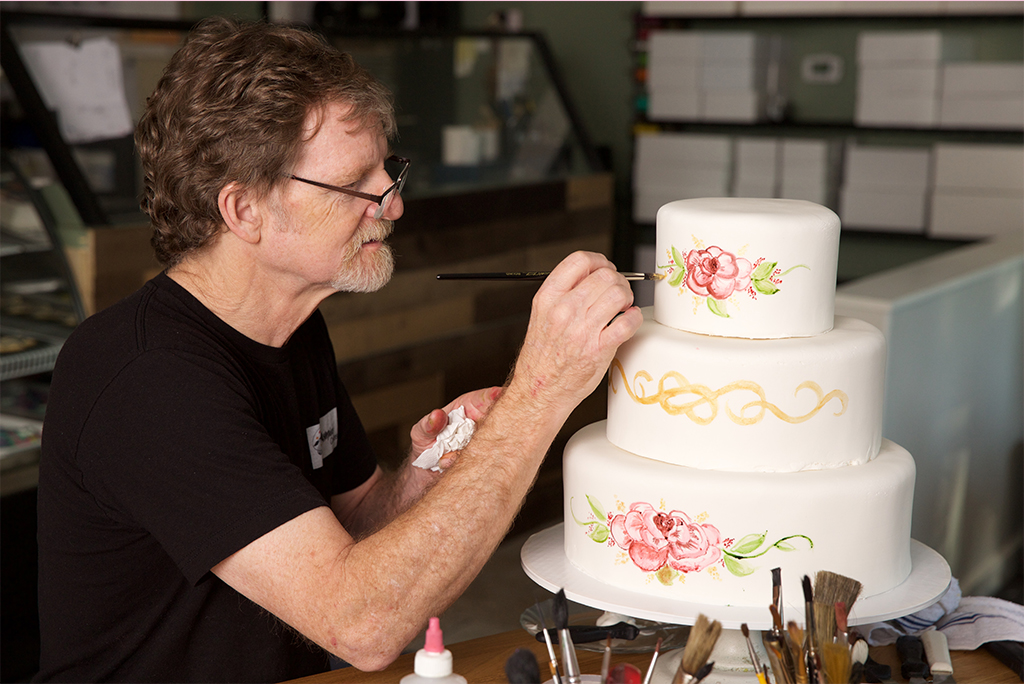
By Roger Drinnon
Oral arguments were heard Dec. 5 in the case of Colorado cake artist Jack Phillips, sued by the Colorado Civil Rights Commission for sexual-orientation discrimination for refusing to make a custom cake for a same-sex wedding ceremony.
The contentious case of Masterpiece Cakeshop v. Colorado Civil Rights Commission likely will determine whether the government can compel Americans to use their abilities and vocations to perform services that violate their faith and conscience. Arguments were extended from the scheduled 60 minutes to 90 minutes to accommodate both sides of the case.
“I am here at the Supreme Court today because I respectfully declined to create a custom cake that would celebrate a view of marriage in direct conflict with my faith’s core teachings on marriage,” said Phillips at a rally following the oral arguments.
He spoke amid chants of “We got Jack’s back!” from a crowd of supporters.
“For that decision, which was guided by an established set of religious beliefs, I’ve endured a five-year court battle. It’s been very hard on me and my family,” he said. “There have been tears and many difficult days for us.”
Phillips said he and his family have faced death threats and harassment, and he has been forced to stop creating the wedding art that he loves while also losing much of his business, as the family struggles to pay bills and keep the shop afloat.
“It’s hard to believe that the government is forcing me to choose between providing for my family and employees and violating my relationship with God. That is not freedom. That is not tolerance,” Phillips added.
The LCMS joined an amicus brief for the U.S. Supreme Court in support of Phillips earlier this year with seven other organizations advocating for religious freedom in the case. The LCMS brief was one of approximately 50 briefs that included scores of religious organizations filed in support of Phillips.
[button link=”https://www.lcms.org/about/leadership/board-of-directors/amicus-briefs”]Download amicus brief[/button]
In July 2016, Alliance Defending Freedom (ADF) attorneys and allied attorneys petitioned the U.S. Supreme Court to take up the case. According to ADF case details, an administrative-law judge ruled in December 2013 against the cake artist, saying that designing cakes for same-sex wedding ceremonies is not speech protected by the First Amendment.
The commission also ordered Phillips and his staff to design cakes for same-sex wedding celebrations; take “corrective action,” including comprehensive staff training; implement new policies to ensure compliance with Colorado anti-discrimination laws; and file quarterly “compliance” reports for two years to show that Phillips has implemented the changes and to document any patrons denied service.
ADF attorneys indicated that when the U.S. Supreme Court rules in this case, it will have a major impact on religious freedom in America, collectively stating, “It could very well be the most important decision in our lifetime” in terms of religious liberty.
ADF also has appealed a related right-of-conscience case to the U.S. Supreme Court. In the case involving Arlene’s Flowers, the Washington Supreme Court upheld a ruling against florist Barronelle Stutzman, who declined to create custom flowers for a longtime customer’s same-sex wedding.
The U.S. Supreme Court could consider this case along with Masterpiece Cakeshop or hold it until its Masterpiece decision is made, and then send the case back to the lower court for reconsideration in light of the new opinion. Last year, the Synod also joined an amicus brief for Stutzman’s case, State of Washington v. Arlene’s Flowers.
[button link=”<https://reporter.lcms.org/2016/synod-joins-amicus-brief-for-florist-sued-twice-over-marriage-view>”]Read about Barronelle Stutzman[/button]
Although neither Phillips nor Stutzman is an LCMS Lutheran, the outcome of each case may pose significant ramifications for the Synod, its agencies, affiliated institutions and members of LCMS congregations.
“Tolerance should be a two-way street. Phillips gladly serves anyone who walks into his store, but, as is customary practice for many artists, he declines opportunities to design for a variety of events and messages that conflict with his deeply held beliefs. In this case, Jack told the couple suing him he’d sell them anything in the store but just couldn’t design a custom cake celebrating their wedding because of his Christian faith,” said ADF Senior Counsel Kristen Waggoner after filing an opening brief with the high court in August.
Waggoner represents both Phillips and Stutzman.
“The First Amendment protects Jack’s right to create artistic expression that is consistent with his core convictions,” she said. “Individuals can support both same-sex marriage and Jack, and people should have the right to disagree on critical matters of conscience. The same government that can force Jack to violate his faith and conscience can force any one of us to do the same.”
The U.S. Supreme Court now must decide, in effect, whether Christians who do not support same-sex marriage have the same liberty as others to live consistently according to their religious beliefs and whether Christians can be compelled to express messages or promote events that violate their faith.
If the high court rules against Phillips (and Stutzman), the ADF says potential ramifications include lawsuits against other creative professionals and Christian business owners who express themselves through their business activities, a rule of law that would not support First Amendment rights for all people.
“I’m profoundly thankful to the Supreme Court of the United States for taking my case. I hope and pray it will affirm the freedom of artists to peacefully express themselves in ways consistent with who they are,” said Phillips.
Last year, the Synod in convention adopted Resolution 14-01 to encourage intentional leadership in matters of religious freedom.
Resources:
To learn more about what the Synod is doing regarding religious liberty, visit its “Free to be Faithful” webpage.
To read about other amicus briefs the LCMS has joined, go to lcms.org/board/amicusbriefs.
Roger Drinnon (roger.drinnon@lcms.org) is director of Editorial and Media Relations for LCMS Communications.
Posted Dec. 6, 2017